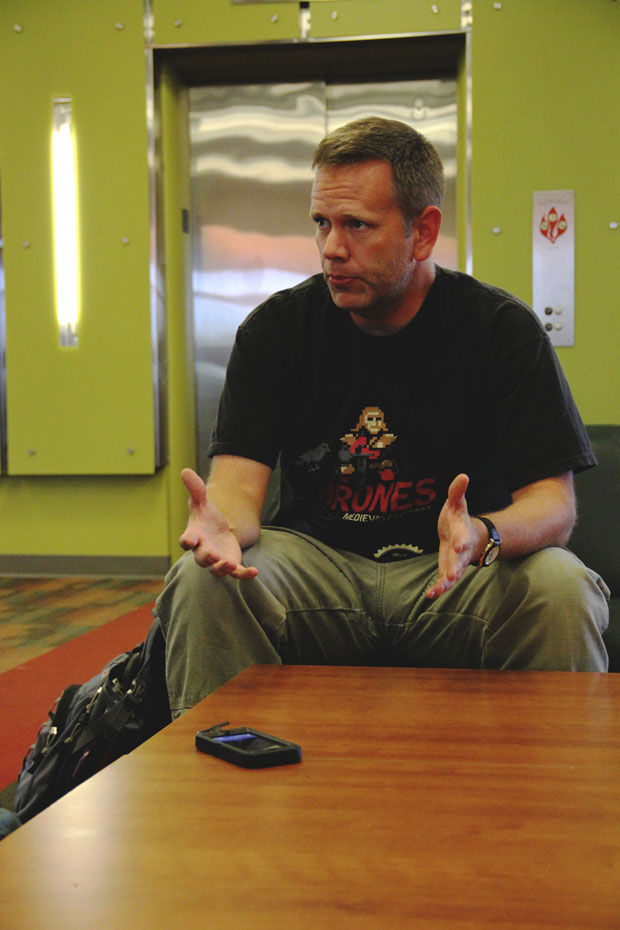WSU student and veteran remembers the day we went to war
September 11, 2014
The first thing WSU student and U.S. veteran Thomas Dill heard when he stepped out of the shower was a radio broadcast saying a plane hit the World Trade Center.
Dill and his fellow service members crowded around a television in the break lounge and continued to watch the coverage until the third plane hit The Pentagon.
“That’s when we knew, ‘oh my God, we’re gonna’ be going to war,’” he said.
An international terrorist attack was not an event Dill, a Coeur d’Alene native, ever anticipated dealing during his career.
For Dill, joining the Armed Forces started as a way to pay for college. After an Air Force stint of 23 years, two months, and one day, he looks back on his career, and how he found exactly what he wanted to do.
Dill described himself as an unmotivated student, and after high school, was working two jobs, realizing that making it on his own would not be as easy as he thought.
“I was 18 years old when I got out of high school,” Dill said. “I thought I knew it all – ‘who needs college? I have this life-thing all figured out.’”
Dill said he was trying to live on his own, but it was becoming apparent that he underestimated the challenges of the real world.
“I feel like he didn’t have much direction or purpose,” his sister Teresa Crowley said.
Fortunately, there were people who saw potential in Dill.
“I had a heart to heart talk with a family friend who basically said I needed to go to college,” Dill said.
No one in Dill’s family had ever been to college, and he had not saved any money for higher education. However, Dill said he had seen the commercials on TV about joining the Army, joining the Navy, and going to college.
“So I went and talked to a recruiter,” Dill said. “Four years of service, a G.I. bill to pay for college, and I can go to school while I’m in? Sounds good to me – sign me up.”
At first joining the Air Force was a temporary solution so he could go to school. He was sure that he would serve his four years, and leave.
More than 10 years later on Sept. 11, 2001, Dill, a Staff Sgt. for the Air Force, was stationed at the Tinker Air Force Base in Oklahoma.
Tinker Base immediately went into lock-down and no one was allowed in or out of the premises. Dill was placed on crew rest, where he was advised to sleep, and get ready to fly the next day.
“I went home and was stunned about what was going on,” Dill said. “Nobody knew if any more planes would be crashing into anything. Nobody knew if there were going to be ground attacks or something like that. So it was very tense.”
When Dill arrived at work the next day, the base was still in lockdown. Security forces had cut a hole in the perimeter fence, and told all essential personnel where to find the opening.
Armed security guards were at the makeshift entrance checking identification, as well as the wing commander of the base who shook everyone’s hand as they drove in. The commander saw Dill’s flight suit, recognizing he would be flying that day.
“He said ‘God be with you, and have a good mission,’” Dill said.
Dill’s crew prepared to take off from their Okla. base, and they called Air Traffic Control who told them their route, direct to New York City.
The sky was clear on Sept. 12, and Dill remembered looking outside the cockpit seeing the smoke still coming out of the World Trade Center.
His crew, receiving orders from their command center, conducted radar surveillance for 12 hours before being cleared to go home.
Fighter planes, authorized to use their fire power in the event of another terrorist attack, were also deployed in the area.
“They were basically told if it’s flying, shoot it down, and we’ll sort it out later,” Dill said.
More rules of engagement were established as time went on, Dill said.
After two months of domestic flight missions, Dill was deployed to the Middle East, a forward operating station that the Air Force had set up in Afghanistan. During his time there, he said that he and his crew did not dwell on the political decisions that were being made back in the States.
“We talked about it – We talked about the legality of being over there,” Dill said. “But the amount of information we had received from back home was very limited.”
For Dill, the most important thing was carrying out the missions he was assigned. He spent six months on surveillance missions, gathering information and pictures from above.
“I was finally doing what I was trained to do, and it was for real,” Dill said. “It wasn’t necessarily the battle we had envisioned, but it was the battle we had received.”
Because there was a lack of opposing air support in Afghanistan, Dill and his crew were fortunate enough to face minimal resistance.
The most interesting missions were at night, Dill said. He was surprised by how dark the area was.
The only break from the darkness was during the bomb raids at night when he said flashes of light could be seen on the horizon.
“When you’re flying at night in the United States, there’s always lights somewhere,” Dill said. “In Afghanistan, looking down, it was like a black hole.”
When Dill returned back to Tinker Air Force Base in Okla. after half a year in Afghanistan, the Air Force was under stop-loss, which meant no one could leave.
“Even if I wanted to get out, they weren’t going to let me,” Dill said.
Instead, Dill thought about what he wanted to do for the rest of his life – he wanted to make the Air Force his career. Despite his enlistment ending in six months, he re-enlisted for another ten years.
Matt Fulks, a flight engineer for the Air Force, was trained and supervised by Dill at Tinker after the attacks.
“He was always brutally honest – I always knew what he wanted,” Fulks said. “But he had a big heart.”
After an Air Force career that spanned over two decades, Dill now spends his time reading, mountain biking, and working with computers. As he pursues a new career path, Dill said he was happy about the time he spent in the armed services.
Dill honorably retired in May 2014 as a Master Sgt. with full benefits – his career lasted 23 years, two months and one day. He is now using his G.I. Bill to pursue a computer science degree at WSU.
“I was doing what I wanted to be doing,” Dill said. “I was proud to serve my country.”






















